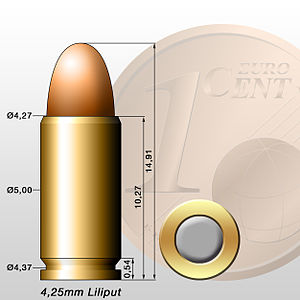The topic of this article may not meet Wikipedia's notability guidelines for products and services. (June 2022) |
The 4.25mm Liliput is a centerfire cartridge originally produced in Austria for self-loading pocket pistols made by Erika before World War I. In 1920 the Liliput pistol was designed by August Menz of Suhl to use the cartridge. The cartridge became best known by the Liliput name used on German ammunition after Austria ceased production. The cartridge headspaces on the mouth of the case. It was the smallest centerfire cartridge in production in the 1930s.[1][2][3]
| 4.25mm Liliput | ||||||||
|---|---|---|---|---|---|---|---|---|
 | ||||||||
| Type | Pistol | |||||||
| Place of origin | Austria-Hungary | |||||||
| Specifications | ||||||||
| Case type | Rimless, straight | |||||||
| Bullet diameter | 4.27 mm (0.168 in) | |||||||
| Neck diameter | 5.00 mm (0.197 in) | |||||||
| Base diameter | 5.00 mm (0.197 in) | |||||||
| Rim diameter | 5.00 mm (0.197 in) | |||||||
| Case length | 10.27 mm (0.404 in) | |||||||
| Overall length | 14.91 mm (0.587 in) | |||||||
| Ballistic performance | ||||||||
| ||||||||
| Source(s): "Textbook of Automatic Pistols" [1] | ||||||||
See also
editReferences
edit- ^ a b *Wilson, R. K. Textbook of Automatic Pistols, pp.261-262. Plantersville, SC: Small Arms Technical Publishing Company, 1943.
- ^ McCollum, Ian (September 2019). "Menz Liliput Pocket Pistols: 4.25mm and 6.35mm". Forgotten Weapons. Retrieved 9 June 2022.
- ^ "Rare Liliput Model 1927 4.25mm". Collectors Firearms. Retrieved 9 June 2022.
External links
edit